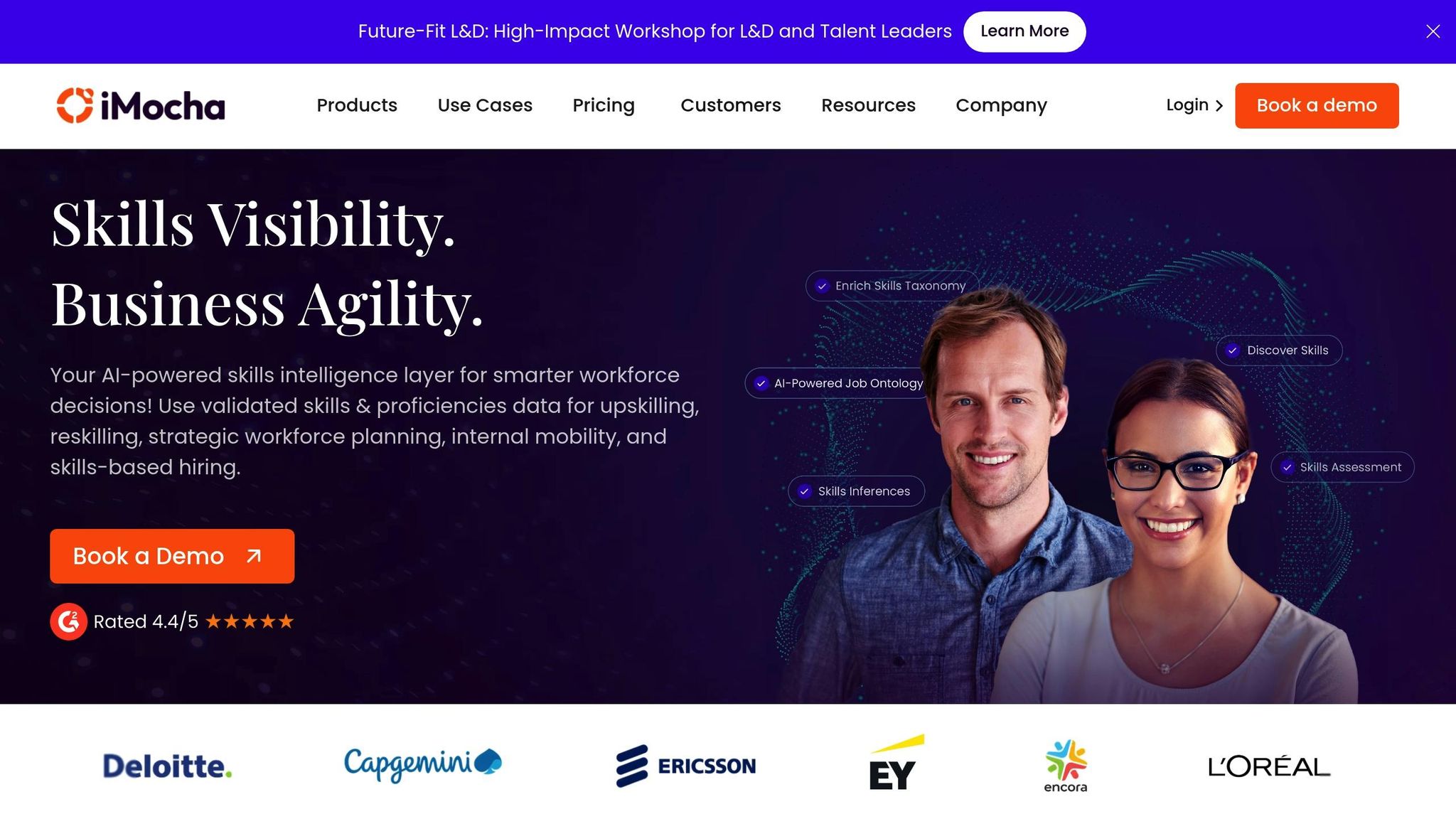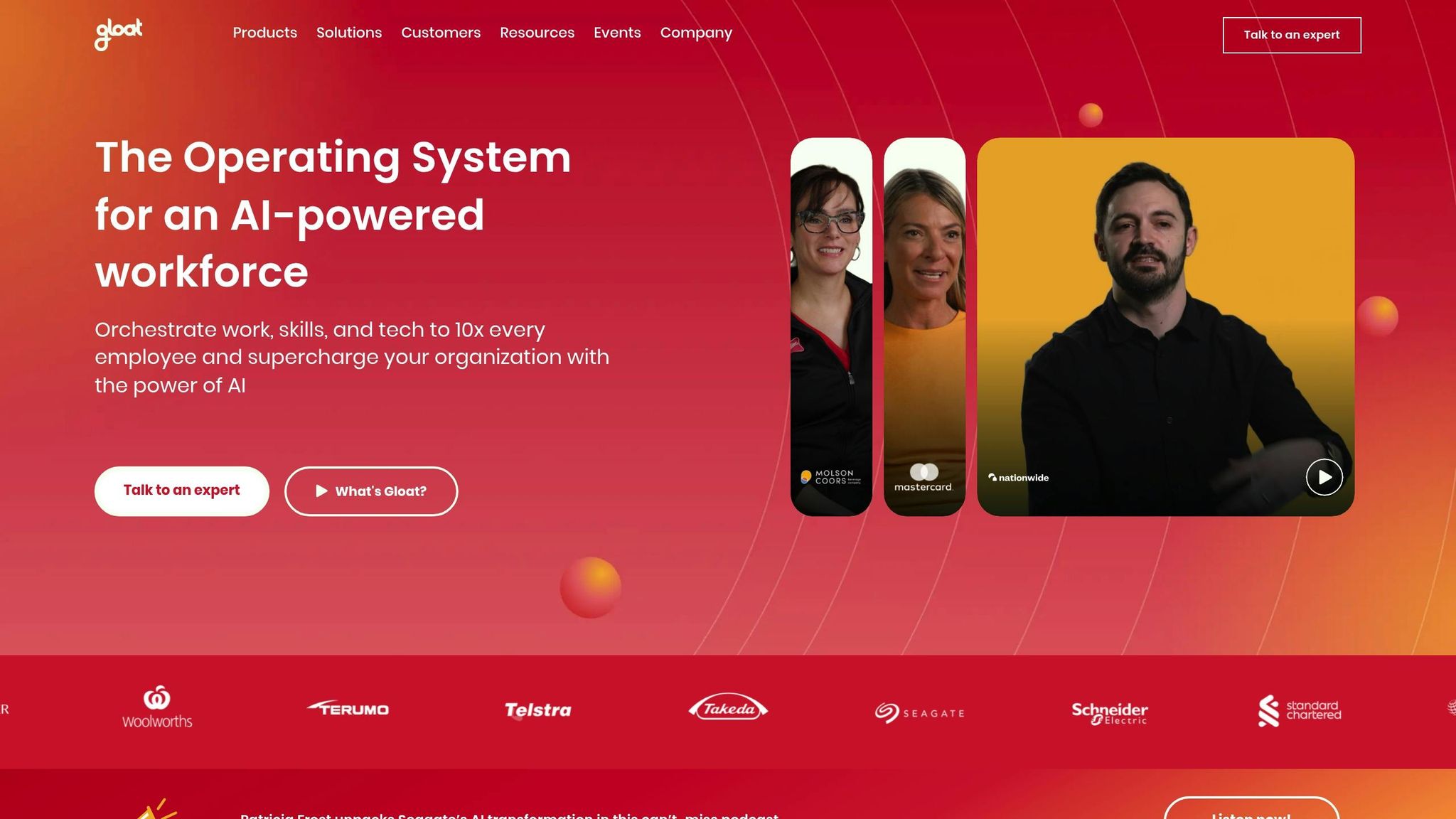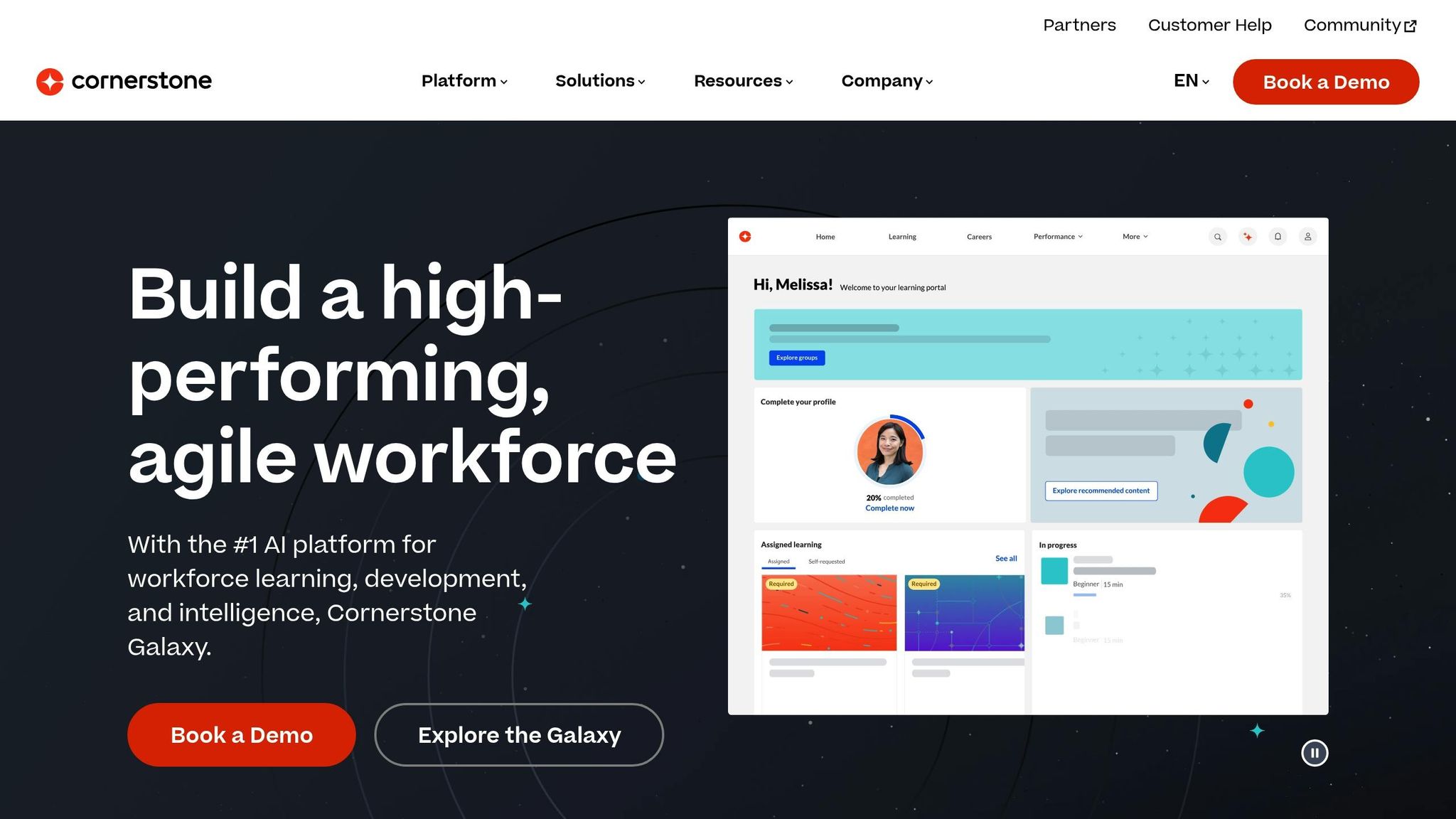
Best AI Skill Mapping Workforce Planning Solutions for 2025
Stop losing top talent to skill gaps. These AI tools help SMBs compete with enterprise hiring while cutting time-to-hire by 40%.

Written by
Adam Stewart
Key Points
- Build skill maps from your existing company data automatically with AI
- Cut hiring time by 40% with skills-based matching vs resume screening
- Close the 63% skill gap that blocks business growth at most companies
- Get enterprise-level workforce analytics without enterprise budgets
Finding the right AI skill mapping workforce planning solutions has become critical for businesses trying to stay competitive. According to the World Economic Forum's Future of Jobs Report 2025, 63% of employers now identify skill gaps as the biggest barrier to business transformation. With 39% of existing skill sets expected to become outdated by 2030, traditional methods like spreadsheets and annual reviews simply can't keep pace.
The good news? AI-powered tools now automate skill mapping, analyze gaps in real-time, and predict future workforce needs. Whether you're running a small business or managing a growing team, these platforms help you align employee capabilities with business goals without drowning in administrative work.
Here's what you need to know about the top AI skill mapping workforce planning solutions available today:
- iMocha: Best for SMBs needing comprehensive skill validation with real-time updates and custom frameworks
- Gloat: Ideal for large enterprises focused on internal talent mobility and career pathing
- Vervoe: Perfect for hiring-focused businesses wanting role-specific skill assessments
- Cornerstone: Great for growing companies seeking all-in-one talent management
- Docebo: Best for organizations prioritizing learning-driven skill development
Quick Comparison: AI Skill Mapping Workforce Planning Solutions
| Tool | Primary Focus | Best For | Pricing | Setup Time |
|---|---|---|---|---|
| iMocha | Skills assessment and mapping | SMBs needing skill validation | Per-assessment pricing | 1-2 weeks |
| Gloat | Talent mobility | Large enterprises (10,000+) | Custom quote | 4-6 weeks |
| Vervoe | Hiring and skill prediction | Hiring-focused SMBs | Starts at $99/month | 2-3 weeks |
| Cornerstone | Talent management | SMBs seeking HR solutions | Per-user monthly fee | 6-8 weeks |
| Docebo | Learning-driven skill mapping | Training-focused organizations | Per-user monthly fee | 2-4 weeks |
sbb-itb-ef0082b
Why AI Skill Mapping Workforce Planning Solutions Matter Now
The numbers paint a clear picture. PwC's 2025 Global AI Jobs Barometer shows that nearly 628,000 job postings demanded at least one AI skill in 2024. Meanwhile, 85% of companies now use skills-based hiring, up from 81% last year according to TestGorilla's State of Skills-Based Hiring 2025 report.
For small and medium-sized businesses, this shift creates both challenges and opportunities. You're competing for talent against larger companies, but AI-powered skills gap analysis vendors can level the playing field by helping you:
- Identify exactly which skills your team has and which ones you need
- Reduce time-to-hire by up to 40% through skills-based screening
- Cut recruitment costs by an average of 30%
- Build targeted training programs instead of generic ones
Companies using these tools are 1.5 times more likely to hit their performance targets. That's not a marginal improvement - it's a significant competitive advantage.
1. iMocha: Best AI-Powered Skills Gap Analysis for SMBs

iMocha stands out as one of the best tools for mapping employee skills to job roles, particularly for small and medium-sized businesses. Its Ground-Up Skills Taxonomy creates structured frameworks from your internal data, making it easier to understand exactly where your workforce stands.
Skills Taxonomy and Mapping Capabilities
The platform uses generative AI to extract skills from curated data sources. It automatically generates job roles, profiles, and proficiency levels across industries including IT services, banking, financial services, and telecommunications.
Here's what makes iMocha's approach effective:
- Parses resumes, certifications, and project records to build dynamic skill graphs
- Infers skills and proficiency levels automatically
- Updates in real-time, flagging inconsistencies to keep data accurate
- Organizes job profiles into primary, secondary, and power skills
In 2025, a bank with over 5,000 employees adopted iMocha to shift to a skills-based model. The platform mapped skills for every role across business units and product lines, creating a continuously updated job architecture.
Features That Support Workforce Planning
iMocha's database includes over 30,000 skills and more than 3,000 skills ontologies spanning various industries. The platform validates skills through assessments, ratings, self-assessments, and AI-driven insights.
Skill Trend Analytics highlights which skills are gaining or losing relevance. Market Benchmarking compares your internal skill frameworks with industry standards. These features help you identify gaps, overlaps, and growth opportunities before they become problems.
Integration and Pricing
The Skill Taxonomy Builder lets you create and manage custom frameworks. iMocha's Taxonomy as a Service (TaaS) model gives SMBs access to enterprise-level skill mapping without needing a large HR analytics team. While standard pricing tiers aren't published, the TaaS approach makes advanced capabilities accessible to smaller organizations.
2. Gloat: Enterprise-Grade AI Skill Mapping for Large Teams

Gloat targets large enterprises with 10,000+ employees, making it less practical for most small businesses. However, if you're scaling rapidly or planning for significant growth, understanding what enterprise-level tools offer can inform your long-term strategy.
What Gloat Does Well
The platform excels at internal talent mobility. Its market-responsive ontology facilitates talent movement based on skills rather than job titles or departments. Machine learning powers career pathing recommendations, helping employees see growth opportunities within the organization.
Johnson & Johnson uses Gloat's AI-driven "skills inference" system to create dynamic, future-ready skills taxonomies. "It's proving to be an important asset in helping us understand and enhance our workforce capabilities," says Jim Swanson, EVP and CIO at J&J.
Pricing and Fit
Gloat's pricing typically ranges from $10 to $100 per user per month, with custom quotes required. The platform expects clients to already have a strong HR technology stack in place. No free trial is available.
For SMBs, Gloat's premium approach and enterprise focus make it a better fit for future consideration rather than immediate adoption.
3. Vervoe: Best Tools for Mapping Employee Skills to Job Roles in Hiring

Vervoe takes a skills-first approach that makes it particularly valuable for SMBs focused on hiring. Instead of relying on resume screening, the platform uses real-world simulations to measure candidates' actual abilities.
Skills Assessment Capabilities
What sets Vervoe apart is its ability to create custom skill assessments tailored to real job requirements. Businesses can design assessments evaluating both hard and soft skills through scenarios that mimic actual workplace challenges.
The platform analyzes candidate performance across multiple dimensions:
- Technical expertise
- Problem-solving ability
- Communication skills
- Role-specific competencies
This multi-faceted evaluation provides a clear picture of how well candidates fit specific roles. Beyond hiring, Vervoe helps SMBs pinpoint skill gaps and determine training needs for existing employees.
Integration Options
Vervoe connects with popular applicant tracking systems and HR platforms like BambooHR, Greenhouse, and Workday. Most SMBs can link Vervoe to their current systems in just a few hours.
Pricing for SMBs
Vervoe's pricing starts at $99 per month for small teams, with scalable plans based on assessment volume. A free trial lets you explore features before committing. The role-specific assessment templates cover positions from sales and customer service to technical and management roles.
The automated scoring system blends AI with human oversight for accurate evaluation. Detailed analytics reveal skill distribution across your workforce, informing decisions about hiring, training, and internal promotions.
4. Cornerstone: Comprehensive AI Skill Mapping Workforce Planning Solutions

Cornerstone OnDemand combines learning management with advanced skill intelligence, making it a strong choice for growing SMBs that want an all-in-one talent management platform. The system helps businesses enhance employee capabilities while mapping existing skills to role requirements.
Dynamic Skill Profile Building
Cornerstone uses machine learning to build skill profiles from multiple sources:
- Job descriptions
- Performance metrics
- Learning activities
- Project assignments
The platform identifies connections between skills and suggests career paths based on current abilities. As team members gain new skills, profiles update automatically without manual adjustments.
Integration Ecosystem
The platform integrates with major HR systems like Workday, SAP SuccessFactors, and ADP. It also connects with productivity tools like Microsoft Teams and Slack through its open API.
Role-Based Mapping Features
Cornerstone creates competency frameworks tailored to specific roles and career levels. Managers can quickly spot skill gaps and suggest targeted learning programs to address them. The integrated talent marketplace lets employees explore internal opportunities matching their skills or career goals.
Scalable pricing options make Cornerstone accessible for SMBs, though it may be on the pricier side for very small teams. The extensive feature set can simplify workforce planning and skill development for businesses ready to invest in comprehensive talent management.
5. Docebo: Learning-Focused AI Skills Gap Analysis
Docebo is a cloud-based learning management system that now includes role-based skill mapping. The platform uses artificial intelligence and machine learning to analyze employee learning patterns and performance data, helping organizations identify skill gaps and tailor training to specific job roles.
Skill Mapping Through Learning
With Docebo, skill profiles build and update automatically as employees complete training modules. This approach connects learning directly to skill development, giving managers visibility into team strengths and improvement areas.
The platform creates personalized learning paths tailored to individual roles. Employees receive recommendations for courses, certifications, and development activities based on their current skills and career goals.
Integration and Pricing
Docebo offers API access for integration with existing HR systems and business tools. Pricing follows a per-user, per-month model with flexible plans based on organization size. Contact Docebo directly for specific pricing details.
Reporting and Analytics
Reporting dashboards track skill development over time, helping managers make informed decisions about training budgets and succession planning. The learning-focused approach makes Docebo particularly valuable for organizations that prioritize ongoing employee development.
Best AI-Driven Skills Gap Analysis Tools: Feature Comparison
This detailed comparison helps you evaluate which AI skill mapping workforce planning solutions best fit your specific needs:
| Feature | iMocha | Gloat | Vervoe | Cornerstone | Docebo |
|---|---|---|---|---|---|
| Primary Focus | Skills assessment and validation | Internal talent mobility | Hiring and skill prediction | Comprehensive talent management | Learning-driven skill mapping |
| AI Capabilities | Automated skill testing and gap analysis | Machine learning for career pathing | Predictive hiring analytics | AI-powered learning recommendations | Learning pattern analysis |
| Best for SMBs | Great for skill validation needs | Companies with 100+ employees | Hiring-focused businesses | Firms seeking all-in-one HR solutions | Training-focused organizations |
| Integration Options | API access, HRIS integration | Extensive HR system connectivity | ATS and HRIS integration | 40+ pre-built integrations | API access, HR system integration |
| Pricing Model | Per-assessment pricing | Contact for custom quote | Subscription-based | Per-user monthly fee | Per-user monthly fee |
| Setup Time | 1-2 weeks | 4-6 weeks | 2-3 weeks | 6-8 weeks | 2-4 weeks |
| Skill Gap Analysis | ✅ Advanced | ✅ Comprehensive | ✅ Basic | ✅ Advanced | ✅ Learning-focused |
| Real-time Updates | ✅ Yes | ✅ Yes | ❌ Limited | ✅ Yes | ✅ Yes |
| Custom Skill Frameworks | ✅ Yes | ✅ Yes | ✅ Limited | ✅ Yes | ✅ Yes |
| Reporting Dashboard | ✅ Detailed | ✅ Executive-level | ✅ Basic | ✅ Comprehensive | ✅ Learning-focused |
How to Choose the Right AI Skill Mapping Workforce Planning Solutions
Selecting the best AI-driven skills gap analysis tools for your organization depends on several factors. Here's a framework to guide your decision:
Consider Your Primary Use Case
- Hiring focus: Vervoe offers the strongest assessment capabilities for evaluating candidates
- Skill validation: iMocha provides comprehensive testing and benchmarking
- Learning and development: Docebo connects training directly to skill growth
- All-in-one talent management: Cornerstone covers the full employee lifecycle
- Enterprise mobility: Gloat excels at internal talent marketplaces
Evaluate Integration Requirements
Look for platforms that connect with your existing HR tech stack. Key integrations to consider:
- HRIS systems (Workday, BambooHR, ADP)
- Applicant tracking systems
- Learning management platforms
- Productivity tools (Slack, Teams)
Factor in Implementation Time
Setup times vary significantly. If you need quick deployment, Vervoe (2-3 weeks) or iMocha (1-2 weeks) may be better choices than Cornerstone (6-8 weeks) or Gloat (4-6 weeks).
Budget Considerations
For SMBs with limited budgets, Vervoe's $99/month starting price offers accessible entry. iMocha's per-assessment model works well for organizations with variable hiring needs. Enterprise solutions like Gloat require larger investments but deliver more comprehensive capabilities.
Implementation Best Practices for AI Skill Mapping
According to the World Economic Forum, 46% of respondents identify organizational culture and resistance to change as a key obstacle to skills-based transformation. Here's how to overcome common implementation challenges:
Start with Clear Objectives
Define what success looks like before selecting a platform. Are you trying to reduce time-to-hire? Identify training gaps? Build succession plans? Clear goals help you measure ROI and maintain focus.
Address Data Quality Early
AI skill mapping tools are only as good as the data they analyze. Audit your existing employee records, job descriptions, and performance data before implementation. Clean, consistent data produces better insights.
Plan for Change Management
Communicate the benefits to employees and managers. Skills-based approaches can feel threatening if people worry about being "scored" or compared. Frame the initiative around growth opportunities and career development rather than evaluation.
Build vs. Buy vs. Borrow
Robert Half's 2025 Salary Guide reports that 40% of managers plan to engage contract professionals to close skills gaps. Your AI skill mapping workforce planning solutions should support multiple talent strategies:
- Build: Train existing staff through targeted development
- Buy: Hire externally for critical gaps
- Borrow: Use contractors or partnerships for specialized needs
- Automate: Let AI handle routine tasks
The ROI of AI Skill Mapping Workforce Planning Solutions
Investing in AI-powered skills gap analysis vendors delivers measurable returns. Here's what the research shows:
- 25-40% reduction in time-to-hire for companies using skills-based hiring platforms (Burning Glass Institute)
- 30% average savings on recruitment costs through pre-screened candidate pools (Deloitte)
- 1.5x more likely to hit performance targets for companies using AI skill mapping
For SMBs, these improvements translate directly to competitive advantage. You can move faster, spend less, and build teams that actually have the skills your business needs.
Beyond Skill Mapping: AI Tools for Business Operations
While AI skill mapping workforce planning solutions focus on talent management, other AI tools can free up time and resources for workforce development. For example, AI-powered customer service platforms handle routine inquiries automatically.
Small businesses can also benefit from AI solutions that manage everyday operations. AI phone answering services handle incoming calls, schedule appointments, and capture leads without requiring additional staff. This frees up your team to focus on higher-value work while ensuring customers always get a response.
Check out Dialzara's pricing plans to see how AI can handle your phone communications while you focus on building your team's capabilities.
Choosing Your AI Skill Mapping Workforce Planning Solutions
AI skill mapping workforce planning solutions have moved from nice-to-have to essential. With 63% of employers identifying skill gaps as their biggest barrier to transformation, the businesses that act now will have a significant advantage.
The tools covered here - iMocha, Gloat, Vervoe, Cornerstone, and Docebo - each bring different strengths to the table. For most SMBs, iMocha or Vervoe offer the best combination of capability and accessibility. Growing organizations may find Cornerstone's comprehensive approach worth the longer implementation time. Enterprise companies with established HR infrastructure can benefit from Gloat's advanced mobility features.
Whatever you choose, the key is to start. Manual skill tracking can't keep pace with how quickly the workforce is changing. AI-driven skill mapping for teams gives you the visibility and agility to build the workforce your business needs - not just today, but for whatever comes next.
FAQs
How do AI tools help SMBs simplify skill mapping and identify skill gaps effectively?
AI tools make skill mapping and gap analysis much more straightforward by using advanced assessments to measure individual and team skills. They compare results to business needs or industry benchmarks, offering real-time insights into where gaps exist. This allows small and medium-sized businesses to create focused training programs and make smarter hiring choices.
With features like automated data analysis and user-friendly dashboards, these tools help you spot areas needing improvement and monitor progress over time. The result? Less guesswork, saved time, and a clear path to building a stronger workforce.
What should small businesses look for when selecting an AI tool for role-based skill mapping?
When selecting an AI tool for role-based skill mapping, focus on a few critical factors. Start by assessing the tool's ability to automatically analyze and tag skills - this feature can drastically cut down on manual work. Next, check how well the tool integrates with your current systems like HR software or training platforms. Finally, evaluate cost and scalability to ensure it fits your budget and can grow with your business.
Additional features like reporting capabilities, custom assessment creation, or integration with hiring workflows can boost efficiency and add extra value. Choose tools that are simple to set up and support your long-term objectives without requiring deep technical expertise.
How can AI-powered tools predict future skill needs, and why is this important for SMB workforce planning?
AI-driven skill mapping tools analyze workforce data and spot trends to predict which skills will be in demand and where gaps might emerge. Using advanced algorithms, they align current employee capabilities with expected industry changes or specific business objectives.
For small and medium-sized businesses, this insight can make a real difference. Knowing what skills will be needed allows you to plan ahead through tailored training programs or smarter hiring strategies. This proactive approach boosts efficiency and helps businesses stay flexible and ready to meet evolving market demands.
What's the difference between AI skill mapping and traditional skills assessments?
Traditional skills assessments typically happen annually or during hiring, creating static snapshots that quickly become outdated. AI skill mapping workforce planning solutions continuously update skill profiles based on new data from training completions, project assignments, and performance metrics.
AI tools also identify skill connections and suggest development paths that manual methods would miss. They can process thousands of data points to reveal patterns in skill gaps across teams, departments, or the entire organization - something that would take HR teams weeks or months to accomplish manually.
Summarize with AI
Related Posts
AI Social Media Tools for SMBs: Comparison
Explore essential AI social media tools for SMBs, comparing features like content creation, scheduling, and analytics to boost engagement and efficiency.
5 Benefits of AI in Performance Management
Explore how AI enhances performance management with data-driven evaluations, efficient processes, real-time feedback, and improved HR decision-making.
Top 7 Tools for Predictive Succession Planning
Explore top AI-powered tools for predictive succession planning that enhance leadership transitions and talent management in organizations.
7 AI-Powered Talent Demand Forecasting Tools for HR
Explore 7 AI-powered talent demand forecasting tools for HR, learn about their key features, and understand how AI is transforming workforce planning and management.
